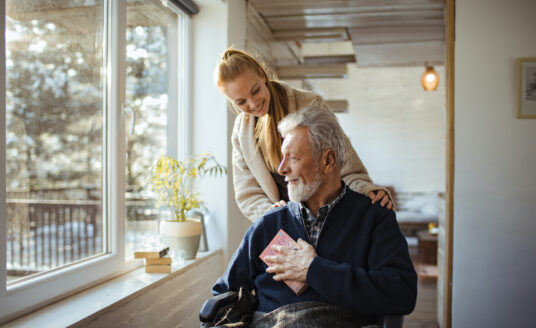Alfred Hitchcock once said, “The length of a film should be directly related to the endurance of the human bladder.” If your bladder is consistently providing much less time than that for relief, you should probably learn about what happens to your bladder health as you age.
Aging and Incontinence
As you age, your urinary tract muscles weaken. Health problems like diabetes, obesity, Parkinson’s disease, congestive heart failure and chronic kidney disease can contribute to incontinence.
Childbirth, menopause, aging and other health factors can lead to poor bladder health in women.
Men can suffer from prostatitis, a painful inflammation of the prostate gland, as well as an enlarged prostate.
In order for normal urination to occur, every part of the urinary tract needs to work effectively. If this does not happen, several issues can occur:
Stress incontinence. Incontinence that occurs when moving, coughing or laughing, which puts additional pressure on the bladder.
Urgency incontinence. A strong urge to urinate is caused when certain nerves and bladder muscles don’t work together to hold in urine. Urine often leaks before reaching a bathroom.
Reflex incontinence. Urine leaks without warning, which often occurs when bladder nerves are damaged.
Temporary incontinence. Bladder health and control challenges that last for a short time due to a temporary situation, such as using a certain medication or having an illness that causes leakage.
Bedwetting. Some medications, drinking caffeine or alcohol at night may cause leakage while sleeping.
Management and Treatments
Lack of bladder control can be annoying and even life-changing if it causes you to avoid physical and social activities. Some people fear the embarrassment of a loss of bladder control during intercourse. The resulting withdrawal and isolation that may follow are not good, particularly for seniors. Don’t let bladder problems take control of your life.
Good habits and proper treatment can improve the quality of your life if you have a bladder control issue. Eating nutritious food, drinking enough fluids, and keeping a healthy weight can contribute to good bladder health. Please consult with your physician for a plan.
Here are some possibilities he or she may recommend:
Limit bladder irritants. Tobacco, caffeine, alcohol and high-citrus content foods can make symptoms worse. Spicy foods, tomato-based products, carbonated drinks, and chocolate can also cause bladder irritation.
Perform pelvic floor exercises. The pelvic floor is the muscular base of the abdomen, attached to the pelvis. These muscles hold up the organs (bladder, bowel and uterus in women) inside the pelvis. Kegel exercises that strengthen the pelvic floor muscles can help prevent or control urinary incontinence. These pelvic floor muscles are the same ones used to stop urination midstream. Harvard Health provides detailed information about how to correctly perform Kegel exercises. These exercises can benefit men as well as women.
Manage constipation. Difficult-to-pass stools increase pressure in the pelvis and bladder.
Change your fluid intake habits. If you get up several times a night to urinate, try to drink more of your fluids in the morning and afternoon than at night.
Talk to your physician. Medications that control high blood pressure, heart medications, diuretics, muscle relaxants, antihistamines, sedatives and antidepressants can contribute to bladder health. Your physician may recommend some changes in your medications as a result.
Bulking agents. Physicians may inject a gel or paste that thickens the area around the urethra, which can also reduce stress incontinence.
Medical devices. These could include a catheter to drain urine from the bladder, or a urethral insert to help prevent leakage.
Medications. According to the Mayo Clinic, there are medications that can control an overactive bladder, as well as ones that relax the bladder muscle and increase the amount of urine the bladder can hold. It might also increase the amount of urine you are able to urinate at one time. Botox injection into the bladder muscle might benefit people who have an overactive bladder as well.
Surgery. This can sometimes improve or cure incontinence, provided it is caused by a change in the position of the bladder or blockage due to an enlarged prostate.
When to See a Physician
Don’t ignore the signs of urinary incontinence. These include the following:
- Needing to urinate more frequently or suddenly
- Cloudy urine
- Blood in the urine
- Pain while urinating
- Passing only small amounts of urine with strong urges to urinate
- Trouble starting or having a weak stream while urinating
Take control of your health. Discover more health tips at Bethesda’s physical health blog.
| Whether you choose independent living, assisted living, memory care, or skilled nursing, your experience at Bethesda will be filled with compassionate care and meaningful connections. If you are considering independent living, we encourage you to tour our communities, including Bethesda Barclay House – Clayton, Bethesda Gardens – Kirkwood, Bethesda Orchard – Webster Groves, Bethesda Terrace – South County, Village North Retirement Community – Florissant, and The Oaks at Bethesda Villas – Kirkwood/Webster. If you have any questions about our non-profit senior living communities, contact us today. |



